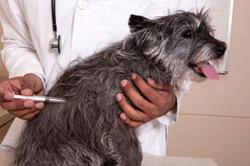How Common are Vaccine Reactions?

How Common are Vaccine Reactions?
Several weeks ago a reader wrote in to ask a question about a very serious vaccine reaction in her cat, and last week I received a panicked phone call from the owner of one of my dog patients. The dog developed a little mass at her rabies vaccination site which has since gone away.
Here are answers to the cat owner’s question and a quick update on what to do if your pet develops swelling at a vaccination site.
How often do vaccine reactions occur?
Vaccine reactions are usually mild and fortunately are quite uncommon, occurring in 40-50 of every 10,000 dogs or cats vaccinated. Life-threatening reactions are extremely rare following vaccination.
What does a vaccine reaction look like?
Puppies and kittens may be tired, lethargic or have a mild fever after their first inoculations. This is also the most common reaction in adult dogs and cats. Allergic reactions also occur. A pet with an allergic reaction to a vaccination has facial swelling, redness around the eyes and itching. Allergic reactions can occur rapidly after a vaccination and you might notice one even before you check out of your veterinarian’s office. You might notice swelling at the injection site a few days after a vaccination is given.
What type of pet is most likely do develop a vaccine reaction?
Small breed, young adult dogs are at greater risk for developing vaccine reactions than are older, large breed dogs. Administration of multiple vaccines at one time increases the risk of a reaction in both dogs and cats. Cats are more likely to have injection site swelling than dogs.
What can be done to prevent a vaccine reaction the next time my pet is vaccinated?
Before vaccination, discuss your pet’s lifestyle with your veterinarian to help him/her recommend the best vaccination protocol for your dog. If multiple vaccines are to be administered, your veterinarian may recommend only one vaccine be given at a time. To lessen the signs of an allergic reaction and to make your pet more comfortable, your veterinarian may choose to administer medications which lessen an allergic reaction. In some pets the reaction is so severe, vaccinations are not administered again.
If you notice anything strange about your pet following vaccination, call your veterinarian. Guidelines recommend a post-vaccination swelling be biopsied if it is growing larger within a month after vaccination, is greater than 2 cm (1 inch) in diameter or persists 3 months after vaccination. If your pet is having an allergic reaction, head straight back to the clinic or to your nearest animal ER.
____________________________________________________________
This may also be found in the “Tales from the Pet Clinic” blog on WebMD.com.
For over a century, The Animal Medical Center has been a national leader in animal health care, known for its expertise, innovation and success in providing routine, specialty and emergency medical care for companion animals. Thanks in part to the enduring generosity of donors, The AMC is also known for its outstanding teaching, research and compassionate community funds. Please help us to continue these efforts. Send your contribution to: The Animal Medical Center, 510 East 62nd Street, New York, NY 10065. For more information, visit www.amcny.org. To make an appointment, please call 212.838.7053.


































